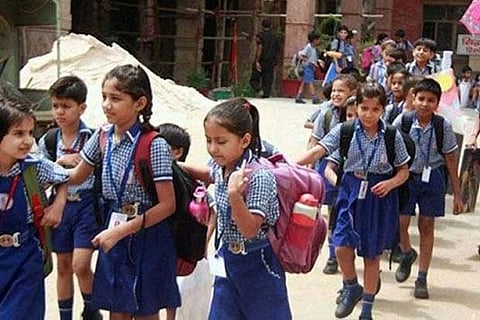

Chennai
Such concerns prompted UNICEF India to take a hard look at what children missed out on the most, amid the onslaught of the coronavirus crisis and themed their World Children’s Day observances (from Nov 14-20) on helping them recover from interruptions and losses to learning experienced during COVID, and ensuring a safe reopening of schools.
The significance of celebrating Children’s Day in India, which falls on the birth anniversary of Pandit Jawaharlal Nehru is amplified this time, owing to how the well-being of youngsters took a hit during the year that went by. Last week, NCRB released data on student suicides that took place in India in 2020. Over 12,500 students took their own lives last year, with an average of 34 lives lost every day. Over 50% of the cases were reported from six states, including Tamil Nadu. The figure rose 21% compared to 2019. The statistic has seen a geometric progression as since 1995, the nation has lost as many as 1.85 lakh students to suicide.
While self-harm perpetrated by youngsters on account of depression, feelings of insufficiency, and inability to deal with failure has been commonplace, disturbing threats to children have emerged post the lockdown when children were glued to screens for an unprecedented amount of time. The Global Threat Assessment Report 2021 said COVID contributed to a major surge in child sexual exploitation and abuse online. An internet watchdog reported a 77% increase in child ‘self-generated’ material of a sexual nature between 2019-20. The study of young adults (between 18-20) conducted globally said one in two children had been subjected to an instance of online sexual harm during childhood as well. Over 34% of respondents were asked to perform explicit acts online during their childhood.
In India too, it was reported that during the pandemic, the National Center for Missing and Exploited Children (NCMEC) recorded a 106% increase in cases of suspected child sexual exploitation. There was a 95% rise in online queries for child sexual abuse material. These trends are being spoken about even as major players in the digital industry are being pulled up for their indifference to the exploitation of children for commercial purposes. Social media, instant messaging, and photo-sharing apps are being collectively called out for diminishing self-worth in impressionable youngsters for years now. The facile and fickle-minded cult of celebrity that has contributed to sexualised imagery of young adults who haven’t yet crossed the threshold of adolescence is a reality in the nation.
The Centre has taken cognizance of such developments and in 2018, the Criminal Law (Amendment) Act was passed, as per which 1,023 fast track special courts (FTSCs) were decided to be set up in 31 States and Union Territories. Of these, 389 courts exclusively dealt with cases about violation of the Protection of Children from Sexual Offences (POCSO) Act. As per government data, against the aforementioned target, 674 FTSCs including 367 POCSO courts have been made functional in about 27 States and UTs by August this 2021. They have collectively disposed of over 56,267 cases too.
There’s a long way to go as far as our responses to the protection of children are concerned. We must strengthen the infrastructure for prevention activities against abuse, whether it’s corporal punishment or sexual abuse in the offline and online space. On the home front, parents could do better by communicating with children, sans the threat of admonishing. A concentrated effort from all stakeholders is necessary to restore childhood, and innocence, where they truly belong.
Visit news.dtnext.in to explore our interactive epaper!
Download the DT Next app for more exciting features!
Click here for iOS
Click here for Android